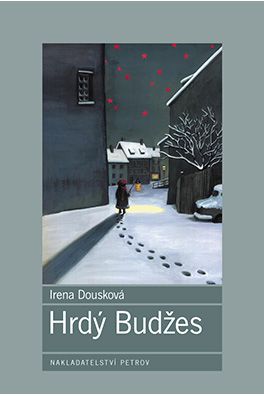
Original title: Hrdý Budžes
Genre: novel
Publisher:
Hynek 1998, Petrov 2002
ISBN: 80-7227-132-6
Pages: 168
Foreign editions:
Bulgarian (Colibri, 2005, Anželina Penčeva and Vladimir Penčev), German (DTV, 2006, Mirko Kraetsch), Hungarian (Kalligram, 2006, Csoma Borbála), Polish (Zysk i S-ka Wydawnictwo, 2007, Joanna Derdowska), Slovenian (Didakta, 2009, Nives Vidrih), Belarussian (Lohvinau, 2013, Veranika Bialkovich), Bosnian (Književni klub Brčko distrikt BiH, 2015, Hasan Zahirovič), Ukrainian (Komora, 2015, Iryna Zabiiaka), Croatian (Hena Com, 2016, Renata Kuchar), English (Pálava Publishing, 2016, Melvyn Clarke), Turkish (Cumartesi Kitaplığı, 2018, Aslı Bülbül Candaş), Russian (Pink Giraffe Books, 2018, Maria Judina), Macedonian (Litera Makedonika, 2020, Mirjana Naumovski), Serbian (Treći trg, 2022, Uroš Nikolić), Italian (Keller Editore, 2023, Raffaella Belletti)
The story of this book is told by a young girl who is at once smart and naive. Helenka guides us through the first years of the “government” of the communist president Husák, describing comic as well as less amusing episodes and situations involving children and grown-ups in one town in the course of a year. The short episodes create a compact story which reveals both the small and greater tragedies of Helenka’s childhood, all presented with a comforting forgiveness.
An extraordinarily successful, frequently reprinted bestseller. Often repeated on Czech television in its stage adaptation, Hrdý Budžes has come to be one of the most famous Czech prose works published since the Velvet Revolution. In the Czech Republic alone more than 65,000 copies have been sold.
In 2006, Irena Dousková published a free continuation of B. Proudew under the title Onegin was a Rusky / Oněgin byl Rusák and another sequel in 2011 (Darda / Darda). Both these books became bestsellers immediately after publishing.
Annotation of the English language publisher of the book (Pálava Publishing):
Helena Součková, an eight-year-old schoolgirl in a small provincial town, deals not only with the uniquely dismal side of life in communist Czechoslovakia, but also with more than a few universal issues, like death, school dinners, guilt, obtuse teachers, betrayal, love, Jewishness, annoying little brothers, almost absent fathers, cruel classmates, bogus adults, eerie daydreams and nightmares that reflect the society around her. A child of her time, Helena nevertheless rises above it all with her special blend of grit, common sense and dark imaginings, which speak to us today with clarity and power. Helena has come to be a well-known archetype that many can identify with.
Hrdý Budžes is now a firm family favourite in the Czech Republic and elsewhere in Central Europe. What has the English-speaking world been missing out on?
From the author's preface in the English edition of the book:
When I started my first year at primary school in Příbram, a district town about fifty kilometres from Prague, in September 1970, my compulsory school attendance began at the same time as that dismal period known as ''normalization'', a time when character was constantly being drained, dignity lost, allegiances turned and lives (particularly professional lives) ruined. (…) That is more or less the background against which the story of my young hero, Helena Součková, is set. It is not a political satire or a panoramic survey of the history of the last century's latter half, but a reflection of all that in our little everyday lives. Like it or not, children, with all their joys and troubles, are influenced and affected by the behaviour of adults, whom they can hardly be expected to fully understand. But then at the same time, they often manage to perceive and identify what is going on around them far more accurately and in focus than the grown-ups around them might guess or would ever be willing to admit.
"Every one of us drags some traumas from childhood into later, adult life. Some people manage to cope with these quite well while others lock them inside themselves for the rest of their lives. Irena Dousková is definitely not pampering hers in her novel B. Proudew. She depicts the world of her childhood as seen by a girl in the second year of elementary school in the town of Ničín, offering a radical and unusual attitude to the era of Normalization in Czechoslovakia and in particular to the world of grown-ups, who are ‘not as mischievous as children, are generally much nicer and don’t laugh at each other for being fat!’ (…) By its very nature B. Proudew is a light, relaxed, gentle and intelligent read which will provoke the reader to tears of laughter and nose-blows of nostalgia."
Bára Gregorová, iliteratura
"B. Proudew is one of those works of literature (compare, in Czech, Striptease Chicago, written in exile by Jan Novák, and Britain's Diaries of Adrian Mole) in which the account of a child - in all its stunning authenticity - is an instrument of revelation and accusation of the imperfect adult world.
The intense witness of a nine-year-old girl is by turns moving and comic, not least by the language in which it is borne. The girl's voice tells of more than our roots, human relations, the world as she finds it: the power of communist tyranny to crush the family seems almost a matter of secondary importance, part of a later plan."
Jan Čulík, Britské listy
"An exceptional eye for detail and an extraordinary understanding of the mind of a child makes of this early Seventies retrospective a fresh and lively variation on that eternal theme "báječná léta pod psa" ["blissful years of lousy living"]."
Vladimír Novotný, Lidové noviny
"The many short chapters are in fact satires on Husák's regime, caricatures of its narrowness and brutality. For her own safety the author has entered the mind of a child, where things have different dimensions and the gap between joy and despair is almost imperceptible, though the sensations of joy and despair are far deeper and much harder on the nerves. [...] Czech prose has never before offered such a view of the misery of Husák's Normalization."
Milan Jungman, Týden